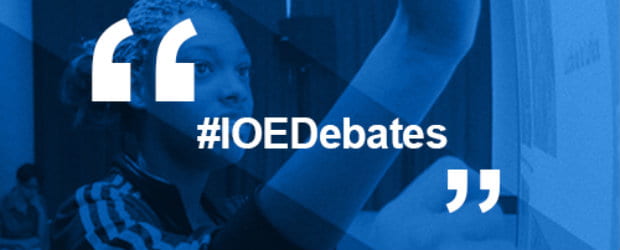Covid-19 and FE – developing citizens, not just skilled workers
By Blog Editor, IOE Digital, on 26 June 2020
26 June 2020
By IOE Events
In the face of the dramatic events of the past few months, further education colleges have demonstrated their resilience. They have been flexible, fleet of foot and characteristically student-centred.
They are about to be presented with a new set of challenges: a new cohort of students who have missed out on several months of their education, a significant drop in apprenticeship opportunities, and communities hit hard by the economic fallout from the pandemic. What will enable colleges to not only ameliorate the impact of these developments, but turn the seismic disruptions of 2020 into an opportunity to realise a more positive future for the localities they serve?
We brought together four representatives from across the FE sector to share their views for our latest debate What if… our education system changed for good in light of COVID-19? Part 2 – further education, chaired by the IOE’s Alison Fuller, Professor of Vocational Education and Work and Pro-Director (Research and Development).
Colleges are most readily associated with attending to the immediate skills needs of the labour market. In that regard they will need to respond swiftly and strategically to the changing shape of the economy and its constituent industries.
But, argued panellists, colleges have another role, for which they are less recognised – and less well funded: developing citizens, not ‘just’ units of human capital.
This role requires us to move beyond notions of colleges as ‘technical skills factories’. It means equipping students with the broader-based education and the transferable skills that will serve them well as both job seekers and active members of society. Those are the ‘soft skills’ of problem-solving, analysis, team work and critical thinking. They are resilience, enthusiasm, being personable. Higher education gives its students a confidence in their abilities that underpins the development of these characteristics. FE policy and funding needs to support this for college students too, now more than ever, panellists said.
How to realise these futures?
- By de-politicising education and working to a longer-term (10- if not 20-year) plan.
- By putting collaboration before competition.
- By focusing on place, the region, the community and joined-up services to support them, in the round.
This may require public ownership of colleges, and shared agencies. It will definitely require substantial government investment now, to avoid the risk of long-term scarring from economic recession.
Taking a place-based view means recognising the interrelation and interdependencies between schools, colleges and universities. The impact of the pandemic on the HE sector will, in particular, have ramifications for our colleges. In the words of one panellist, the government needs to decide what universities are for in these new times, and the FE sector needs to be round that table.
And that tees us up nicely for the final debate on Covid-19 and education What if… our education system changed for good in light of Covid-19? Part 3: higher education, 2 July.
You can listen to or watch the FE debate here.
Check out our Covid-19 debate on schools here.
 Close
Close




